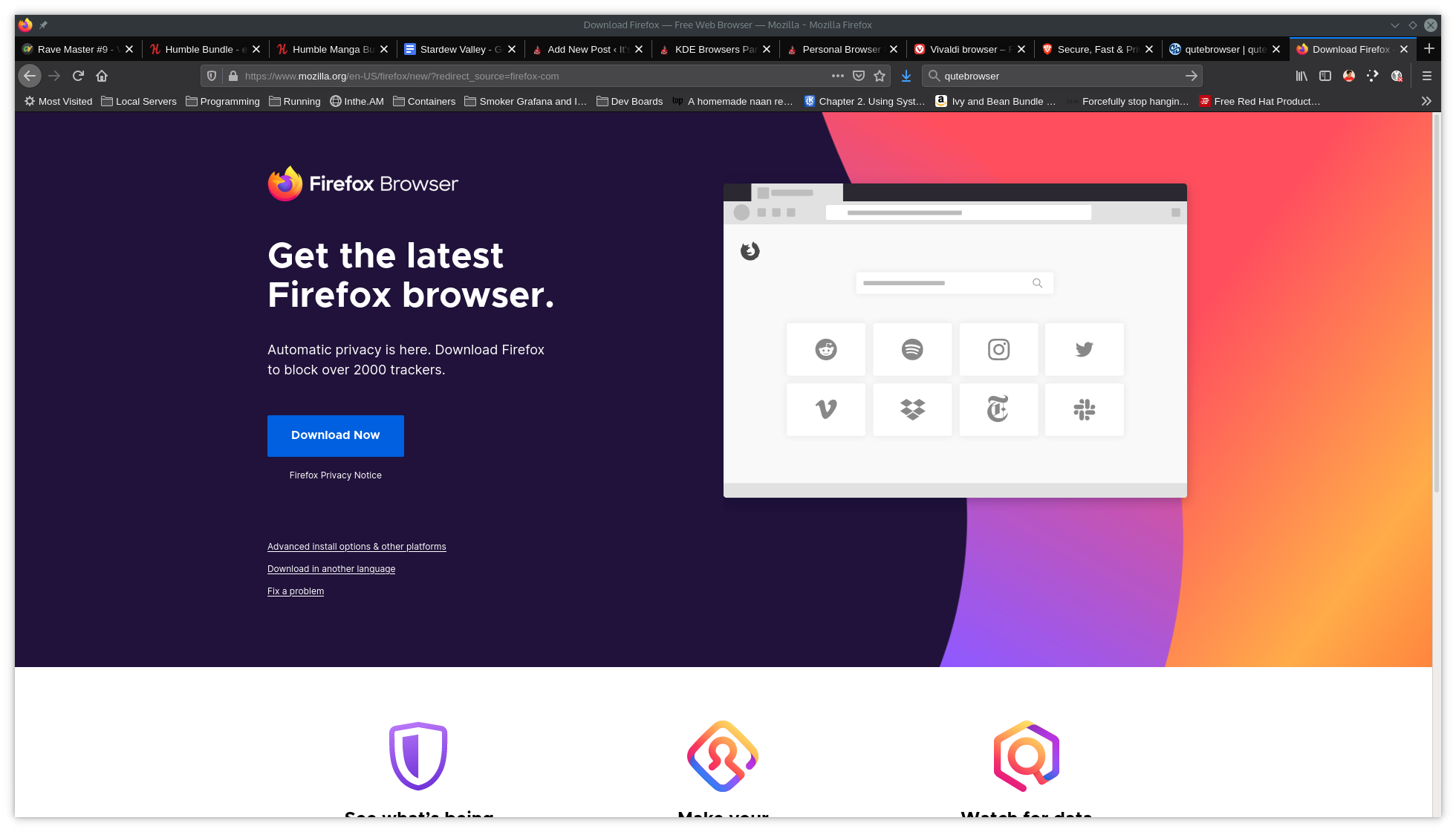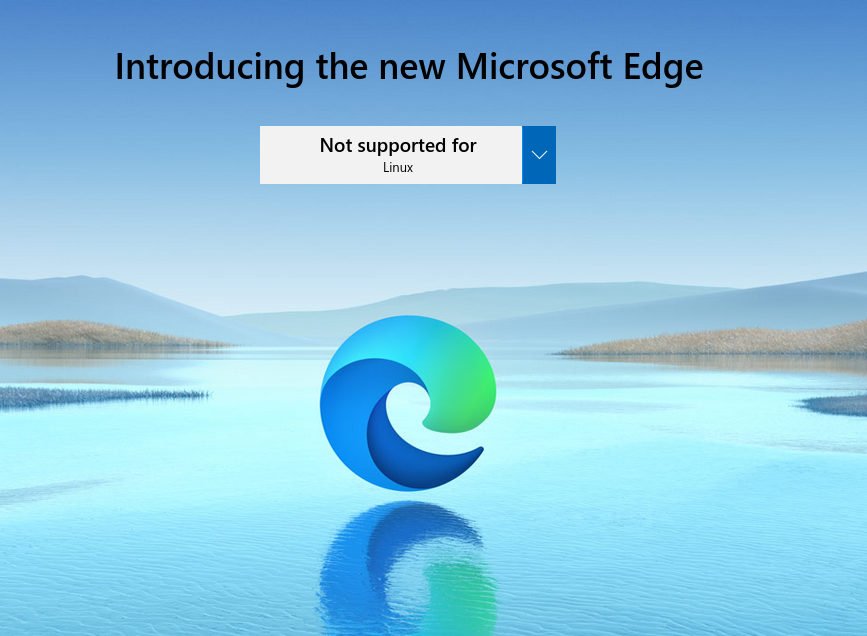It’s been a while since I last considered web browsers. I wrote this post in 2008 about which browsers I was using. And in 2011 I wrote this post about KDE Browsers. So that’s at least 9 years since I wrote about browsers. What is my current situation?
Well, on Linux I bounced back and forth between Firefox and Chrome, depending on which one was getting better performance. At this point, for what I do, Firefox is the winner for me. I use it on my laptop and desktop and it gets things done without getting in my way. I don’t necessarily have the most modern GUI setup because it tends to keep your GUI settings as you upgrade. This is what it looks like:

I’ve set a dark color scheme to match my dark scheme on KDE.
I don’t use Chromium, but I have it installed. I use Falkon sometimes to segregate browsing and reduce cross-tab scripting malware. For Chrome, it actually now takes FOREVER to start up on my computer (relative to Firefox, Falkon, or non-browsers) so I rarely use it.
Over on Windows I use Chrome. I think for a little bit Firefox had fallen behind in terms of performance on Windows and I haven’t really seen a reason to change my defaults.
I put out a call on Reddit to see if there were other browsers worth checking out. I heard about some browsers that I’d already seen bandied about (Brave) and some I’d never heard of (qutebrowser) and a few others. So I think for the first time in a decade, I’m excited about the browser space again. (Also, the old guard continues to innovate. This morning I read about a new, neat type of link that Google Chrome is pioneering. And the Mozilla foundation has a bunch of neat R&D projects like WebVR and the web of things.) The browsers I intend to check out (and maybe write a post or two about) are:
- Brave – This browser has me excited for a number of reasons. It’s co-created by Eich, who created Javascript (in a week, if I remember correctly) and who co-founded Mozilla. Yes, it’s based on Chromium (just like Oracle and Red Hat it’s odd to be competing with the same code base if you’re not equally contributing), but they seem to really be making a large effort to find the true balance needed for the web when it comes to advertising. Blocking all ads could kill off most professional content and drive it behind a paywall. Allowing all ads opens you up to privacy violations. But Brave tries to fix this by replacing tracking ads with non-tracking ads. There’s a lot of room for things to go wrong and for that to create some bad incentives, but on the surface it seems awesome. This *might* be the browser I move to on Windows. (And maybe also on Linux) Also, their private browsing mode (can?) include Tor.
- qutebrowser – “everyone” loves Vim. Nearly every editor has a Vim-compatibility mode. This browser takes that to the extreme. It’s a keyboard-based driver (perhaps it should be the default on the Rat Poison Window Manager) that uses a lot of Vim shortcuts – like hjkl for moving around on a page and : (colon) to give various commands to the browser. On the negative side, you have to completely relearn all your browser keyboard shortcuts. On the positive side, you have almost no need for any mouse usage (there’s even a shortcut that gives you a shortcut letter to a link so you don’t have to go link-by-link as I’ve had to do in the past with a commandline browser) so it could be extra great for RSI sufferers who are trying to limit their mouse usage. There’s also probably a pretty bit productivity gain once you get used to the shortcuts because your hands never have to leave the keyboard.
- Vivaldi – If you go through my old browser posts you’ll see that there was a chunk of time where I really loved Opera and ran it as my main browser on Windows. Vivaldi is the spiritual successor to Opera after the company went from being Scandinavian-owned to Chinese-owned. A bunch of the hackers went off to start Vivaldi. This, like Brave, is another Chromium-based browser. But they bring Opera-level customization and features to the browser to transform it into something unrecognizable for sharing the same code under the hood as Chrome. Of course, this makes it similar to qutebrowser in the sense that you really have to go all-in to truly comprehend and use all the features. (Just go to that front page and scroll through the features. As of today there are 15 features touted on the home page) This is why, like the original Opera, those who love Vivaldi LOVE Vivaldi. Once you get to that level, it’s hard going back to a plain browser. I’ve played with it a little, but haven’t really given it a proper spin. (Partially because when I first installed it onto Fedora it was still in Beta). I could see this possibly becoming my daily driver on Windows and maybe on Linux.
- Microsoft Edge?!? – obviously this would just be on Windows. As you can see in the below image, no Edge for Linux. (yet?) So, since Firefox I never liked any iteration of Internet Explorer even as they tried and tried to make it not be so crufty. When they first introduced Edge, I tried it a couple times because it was the default on a computer. I didn’t care for it. But now it’s based on Chromium AND it seems to be getting rave reviews online. Could that be paid content? Perhaps. Nothing surprises me on the web anymore. But perhaps it’s worth checking out…

So, there we go, a trio of browsers I’m interested in and why I believe the browser space is getting to be a lot of fun even if we’re mostly down to either a Chromium or a Firefox (is their engine still Gecko? Or would I call the Chromium equivalent Aurora?) backend. (Note: qutebrowser uses QtWebEngine – not sure if that shares any DNA with Chromium) In some ways, browsers have become like Linux distros. They’ve all got the same underlying packages – gcc, KDE, etc – but what they bring to the table is the UI and how polished the final product is. It’s not a perfect metaphor because Google controls both the package equivalent (Chromium) and the distro equivalent (Chrome), but there’s still room for improvement without the stagnation we saw when Internet Explorer had a 90% market share. (At least not yet. We’ll see what happens with Google if Brave, Ungoogled Chrome, and other potentially revenue-sapping browsers catch on)
On Windows I could easily see myself ending up on Brave. I’m already using Chrome, so why not a Chrome that’s less tracking? Also, my browser on Windows is of minimal importance these days since my Windows computer is just my video game machine / video game streaming machine. 99% of my Windows web browsing is to Youtube to upload my “Let’s Play” videos. Or maybe I could once again go the Opera-route and do Vivaldi. Maybe even the unthinkable (for 10 years-ago-Eric) and go back to Microsoft with Edge.
On Linux I’m probably more likely to stay with Firefox. But I could maybe see myself being tempted by qutebrowser or Vivaldi. Brave is a distant possibility, but maybe it will convince me.
